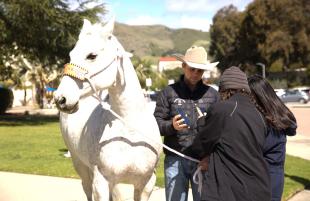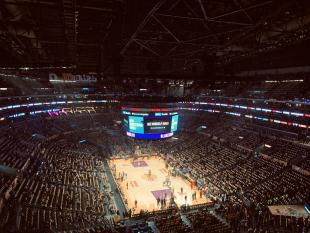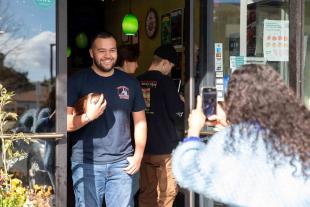Three Startups to Watch from the CIE's Demo Day
At the Center for Innovation and Entrepreneurship’s Demo Day in early September, eight startup teams who participated in the CIE’s 2024 Summer Accelerator showcased their businesses to the community – and the future looks bright.
“This year’s cohort is really exceptional in that they are showcasing such a diverse range of innovative solutions that reflect their understanding of market needs and entrepreneurial resilience,” said CIE Academic Programs Director Dr. Thomas Katona. The cohort included many recent Cal Poly graduates representing a variety of industries and disciplines, from medical devices to gaming software.
In recent months, startups that have gone through CIE programs have gone on to win multiple competitions. For example, Nexstera Tech, which hopes to use artificial intelligence-driven radar technology to pinpoint lithium-ion battery risks within waste streams, recently won at the Sunstone Startup Launch Competition and at AngelCon, a pitch competition that connects Central California tech startups and investors for funding and mentorship.
A few Demo Day speakers mentioned that the CIE’s time in its current downtown SLO space will soon be coming to a close. In June, the CIE announced its plans to move from its current location into a redeveloped space at 1144 Chorro St. The space will expand access and collaboration among economic development partners, students, faculty, local entrepreneurs, and startups in emerging industries.
“This space will bring together students, entrepreneurs and community partners to create new opportunities and support the next generation of innovators and helping to build a stronger, more vibrant Central Coast,” said Karen Tillman, economic development advisor to Cal Poly President Jeffrey Armstrong and interim executive director of the CIE.
The Summer Accelerator program is an intensive, 12-week startup bootcamp where student-founder teams progress through the initial startup phase of business development. Here are three startups to watch from the 2024 Summer Accelerator.
Everest Medical
After winning third place at the CIE’s Innovation Quest (iQ) this past spring, the biomedical engineering graduates at the heart of Everest Medical were inspired to take their class project to the next level by joining the Accelerator, CEO Jenna Eissmann said.
The company is developing a single-use device aimed at creating a safer alternative for mothers and their infants during shoulder dystocia complications from vaginal births.
“During natural childbirth, the baby can be stuck in a position where the head will be delivered but the body is stuck. Once that happens, the doctor has a maximum of three to five minutes to deliver the baby before it asphyxiates,” Eissmann said.
Around the time the team won third at Innovation Quest, Eismann discovered that a close friend had shoulder dystocia as a newborn. She had to have her collarbone broken, and her father later told Eissmann that it was the most horrific thing he’d seen.
“Hearing that story straight from them and hearing echoes of that story when speaking with labor and delivery nurses was huge,” she said. “It validated that this is a problem and this is a need. I know someone who, if this device had existed 20 years ago, maybe wouldn’t have experienced what she did.”
Everest Medical’s device, which is still in development, is designed to be an extension of the physician’s arms, using a swaddling motion to help move the baby out. Eissmann said the team hopes to apply for a patent by the end of this year, then continue to show their device to doctors and others within the medical community. They aim to go to market in 2028, pending FDA approval.
“It's our vision as a company to have this on hand in every obstetric hospital when they need it,” Eissmann said. “It’s something you can’t predict, it’s a huge clinical need and even more of an incentive for us to accomplish our mission that makes it so much more rewarding too.”
ODIN Diagnostics
Concussions are brain injuries that can seriously impact peoples’ quality of life – and a particularly common hazard for athletes. ODIN Diagnostics hopes to quickly and accurately diagnose concussions via a portable headset that uses ocular tracking technology.
“As a football player, I’ve suffered a couple of concussions,” said CEO and economics graduate Connor Heffler, who played on the Cal Poly football team all four years of college. “I’ve witnessed a lot of my teammates who’ve lost their athletic careers or have had serious side effects from concussions, and it felt like something we should look further into.”
Heffler and his team won first place at Innovation Quest in April and he took ODIN into the Summer Accelerator program shortly after. During their time in the Accelerator, they worked with Stacey Ritter, a local concussion specialist, who has advised the team as they have developed their proprietary concussion test.
In September, the team found out they were accepted into the CIE’s Incubator, a two-year program for startup founders that provides early-stage companies with an advisory board, an assigned lead mentor, capital and other curated resources in a collaborative in-person environment. Heffler said they plan on doing a pilot study with their technology this winter with a few select testing partners and continue working with their early adopter market, the key market they will scale in.
Heffler says the team’s goal is to get their technology developed and expand it nationally, getting it into the hands of medical professionals and making sure it can help as many people as possible.
“You see athletes around the nation dying from concussions, and I think if our product can save one life that’s a success story,” Heffler said. “Successive concussions are really dangerous. Our product will improve the detection rate of concussions and help prevent long-term brain damage in athletes across all sports, ultimately saving lives.”
GreenSight Tech
GreenSight Tech’s mission is simple: keep electronics out of landfills.
“Right now, about 80% of electronics wind up in a landfill,” said CEO and engineering graduate Jake Daniels. GreenSight’s technology uses artificial intelligence to help electronic refurbishers and resellers efficiently process, redistribute and remarket used devices, promoting a circular economy for electronics.
The team got the idea when one of their members, Diego Curiel, had a pile of microcontrollers left over from a computer science class and had trouble getting rid of them. The group spoke to multiple surplus and IT departments including Cal Poly Surplus, which gets rid of old electronics on campus, to learn more about the typical process for disposing of electronics.
“There are a lot of problems with the process and even large businesses have to deal with this,” Daniels said. “It’s almost entirely manual. They’re not using internal and market data, instead they’re going off their own experience and making assumptions.”
They participated in Innovation Quest this past spring and had a great experience that led to them applying for the Accelerator.
“We got some strong customer traction and talked to people who told us, ‘If you’re making this, we would pay for it,’” Daniels said, adding that helped them realize they had something that they just needed to execute on. “We realized the Accelerator would really help us bring this idea to life and bring the product to market.”
Daniels said the Accelerator was the first time where all team members were working full-time on the project, and it felt less like a school project and more like a real business.
“It changed how we approach things and gave us a structure,” he said.
Daniels said the team plans to incorporate as a business this fall, continue customer and software development and keep expanding their functionalities and customer base until they have a full platform and can scale the business.
Want more Learn by Doing stories in your life? Sign up for our monthly newsletter, the Cal Poly News Recap!




